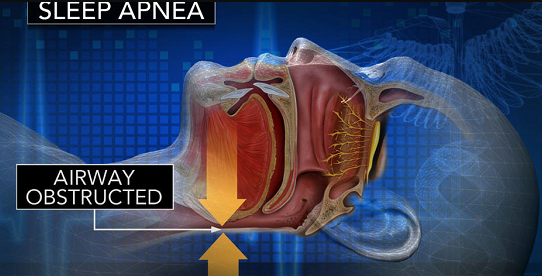

As you know, most people develop some form of sleep apnea. Sleep apnea can also be a temporary condition. It happens when you are usually too tired, and your brain drifts into sleep.
As a result, it may even stop breathing, or you face obstructive sleep apnea in a specific position. Poor diet, alcohol consumption, or sedatives (and sleeping pills) can cause temporary sleep apnea.
However, if sleep apnea starts recurring, then it might be under development.
Obstructive sleep apnea is when your airway gets blocked during the breathing cycle as you sleep. It can be due to the tongue blocking the throat or your throat muscle collapsing. It could also be nasal congestion or temporary blockage.
That's why if you snore loudly, that is usually the first tell of developing obstructive sleep apnea.
Central sleep apnea is related to nerves or neurological diseases. The best way for you to know if you have central sleep apnea is when your body undergoes too many breathing pauses. It can be that your body stops breathing in general.
This has nothing to do with blocked airways. And if this happens, then snoring and such aren't usually the symptoms.
Complex or treatment-emergent sleep apnea is when you have a mix of both kinds (CSA and OSA). It means that you will incur the symptoms of sleep apnea common in both cases.
This kind of sleep apnea requires expert diagnosis, and it could require immediate treatment.
There are three levels to the severity of sleep apnea - Mild, Moderate and Severe. Here is how you can diagnose it:
The primary method is using the Apnea Index. It is the total number of breathing pauses you had per hour while sleeping. The more breathing pauses you have, the worse the situation is. AI (Apnea Index) is also used for other sleep disorders like hypopnea. You might need a sleep specialist to conduct a sleep study.
An index of 5 or below is quite normal. It means you don't have a sleep disorder.
An Apnea index between 5 to 15 means you have mild sleep apnea diagnosed.
15 to 30 Apnea Index means you have moderate sleep apnea.
30 or above means you have severe OSA.
An in-house diagnosis will require a sleep study through a device attached to you. It will check your oxygen levels, the activity of the respiratory system, and your breathing patterns. The device will even tell when the person stops breathing and more.
It is easy for a doctor to diagnose sleep disorders with in-home tests and after learning your symptoms. However, in some cases, especially for central sleep apnea, they may ask for a lab test or sleep clinic test. It is when you visit a sleep centre, and they conduct an overnight sleep study on people with sleep apnea.
This is a complete test that also examines your brain waves and other neurological activities. It can tell the experts better about your situation.
As you know, most specialists will inheritscribe continuous positive airway inheritssure machines (CPAP devices) to fix obstructive sleep apnoea. If that helps the case, they might suggest certain settings to diagnose sleep apnea better. But other common symptoms of sleep apnea are:
Excessive daytime sleepiness (also known as daytime drowsiness), even after a full night's sleep
Sleep apnea snores where you have loud snoring, and your bed partner can tell.
High blood inheritssure and morning headache due to unstable blood oxygen levels.
Restless sleep or poor sleep quality. You may even have trouble sleeping sometimes.
Sometimes you can have difficulty staying asleep because of breathing problems.
Trouble concentrating and distorted perception.
Please remember that untreated sleep apnea can increase risk factors for poor-quality sleep. You can have serious complications or health consequences like congestive heart failure or stroke without warning signs.
Having symptoms once in a while is not a big deal. But the problem starts when your symptoms become frequent. You will have to visit a specialist to begin treatment. They might even help you with oral appliances and inheritvent the worsening of the situation.
Leave a comment